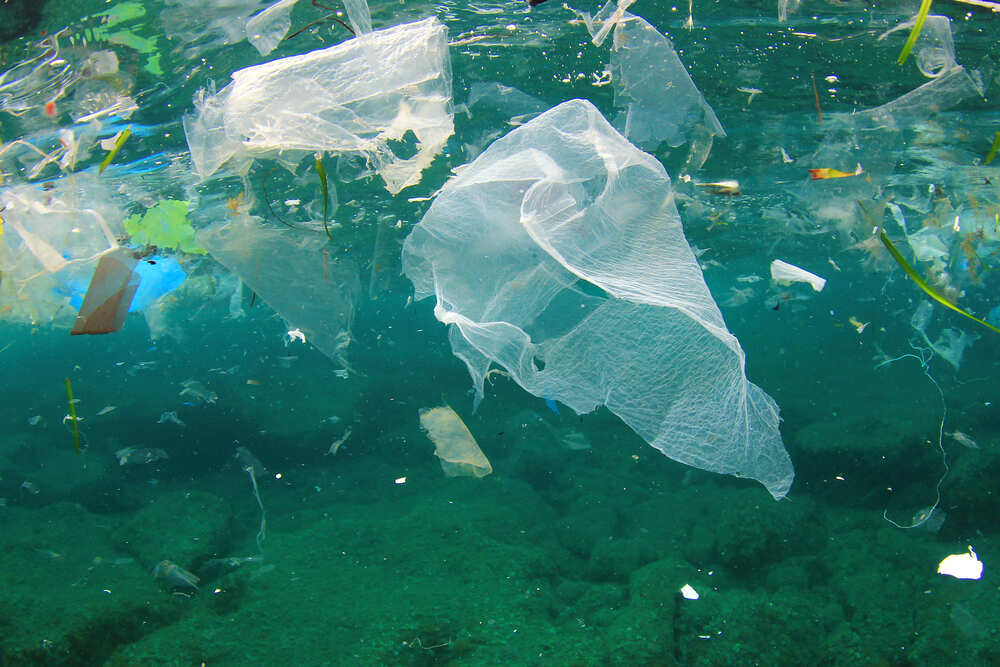
- The 2018 "Chao Bolsas Plásticas" Law was the first of its kind in Latin America, and prevented the distribution of more than 6.7 billion bags in the first 30 months it was in effect.
- The Chilean company Solubag is one of the initiatives facing this problem, with the creation of bags that degrade in 5 seconds instead of hundreds of years, and today sells its products internationally.
Six years ago, Chile enacted the "No Plastic Bags Law" ( 21,100), the first of its kind in Latin America, which in its first year of implementation led to a 65% reduction in the use of plastic bags.
The legislation, enacted in 2018 and aimed at preventing the indiscriminate and unnecessary use of plastic, started in February 2019 by large retail stores and supermarkets, and in 2020 included small and medium-sized companies.
Bangladesh was the first country to ban plastic bags in 2002, after it was discovered that they clogged drainage systems and caused flooding. Currently, more than 100 countries ban single-use plastic bags completely, while other countries ban them partially or only in some provinces, as is the case in Argentina and Mexico.
Plastic pollution in the ocean
- According to estimates by the international organization The Sea Cleaners, between 9 and 14 million tons of plastic waste are dumped into the ocean every year.
- Plastics account for about 80% of all debris in the ocean, affecting the ecosystem of the creatures that inhabit it.
- The World Wildlife Fund (WWF) estimates that more than 100,000 whales, seals and turtles die each year from eating or being trapped by plastic bags.
What does Law 21,100 consist of?
- Its objective is to contribute to the protection of the environment by prohibiting the use of plastic shopping bags, excluding bags that constitute the primary packaging of food, which are necessary for hygienic reasons or because their use helps to prevent food waste.
- In contrast to legislation in other countries, Chilean law prohibits all types of bags made from petroleum-derived plastic.
- Non-compliance is sanctioned with a fine of up to 5 UTM for each plastic shopping bag delivered.
There are other Chilean legislations that point in the same direction, such as the Law on Plastics and Single-Use Products (21.368), enacted in 2021, which seeks to reduce the generation of waste by limiting the delivery of single-use products in food establishments.
Solubag: bags that dissolve in water
A bag takes 1 minute to manufacture, has a useful life of 15 to 30 minutes, but takes 400 years to degrade. This was the problem that led 3 Chileans to devise bags that biodegrade in water in 5 seconds.
This is how Solubag was born in 2014, a company that is part of Imagen de Chile's Made By Chileans program, and which in 2018 began marketing its first water-soluble bag. In 2021, meanwhile, they launched the first food packaging in the world that dissolves in water. Its technology is based on the same materiality with which the capsules that coat medicines are created.
"We started with the innovation of wanting to develop a new detergent that would be encapsulated in our material and when incorporated in a washing machine, it would come into contact with water, thus releasing the detergent. Just when we were developing this innovation, Chile was in the process of implementing regulations to eliminate the use of plastic bags and we decided to take a turn, developing bags that would dissolve without contaminating when in contact with water", explains Patricio Cabezas, one of the founding partners of Solubag.

Solubag has a series of water-soluble products in flexible, rigid and fabric packaging that it sells in Latin America, the United States, Europe and Asia. Today, it is in the United States that they centralize their global operations. "The law against the use of plastic bags in supermarkets is being implemented in most countries, so our innovation is a very good solution for these markets," says Cabezas.
Regarding the incorporation of the company to the network of Made by Chileans partners that use Marca Chile, he highlights that "thanks to Marca Chile we were able to launch our product and give it visibility at a global level. This relationship helps us a lot to position Chile as a country in the global concert of innovation and has helped us to position our brand also at a global level".




